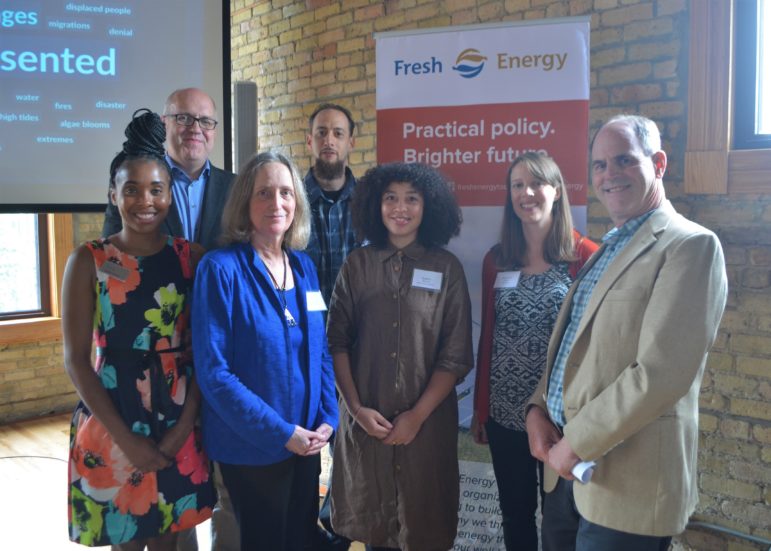
L-R front row: Martina Holmes, Jane Kirtley, Sophia Benrud, Elizabeth Dunbar, Michael Noble
To make progress on climate and energy we must grapple with serious questions. On June 27 Fresh Energy and our Energy News Network hosted a dynamic panel event where four media experts tackled the issue of how and whether journalists should more urgently cover climate change. We put leading professionals in the hot seat. The conversation was lively and reflected the complexity of covering energy and climate issues and ensuring that all voices are heard.
The event moderator, Jane Kirtley, the Silha Professor of Media Ethics and Law at the Hubbard School of Journalism and Mass Communication at the University of Minnesota, opened the panel with a provocative question: should journalists take a side on climate change?
Here are a few highlights of the answers from our panelists.
Sophia Benrud, an environmental justice organizer for Black Visions Collective, argued in the affirmative and challenged mainstream news outlets to also recognize their reporting is often inaccessible to the communities that are most impacted by climate change. She posed a change to the phrase “climate change” and suggested “environmental violence” as an alternative and urged the audience to consider the choices we collectively make that contribute to our planet’s degradation.
Elizabeth Dunbar, a reporter with Minnesota Public Radio, covering the environment, energy and climate change, made it clear it’s not taking a position to say that climate change is real, mostly caused by humans, and is happening now. She believes her job is to not to prescribe specific solutions to the problem, but rather to elevate stories that demonstrate how we can all tackle this crisis together.
Niko Georgiades, founder and journalist member of the independent media organization Unicorn Riot, noted his role is to lift up stories of resistance to climate change and corporate backing of fossil fuel projects. He argued that media professionals have a duty to shine a light on stories often missed in mainstream outlets, ones that capture the perseverance and resistance of communities engaged in social and environmental conflicts.
Ken Paulman, director and founding editor of the Energy News Network, highlighted the seemingly radical nature of climate change reporting in today’s times: “Stating a fact can sometimes feel like activism. That’s how polarized the issue of climate change has become.” He urged journalists to do better in engaging with communities most directly impacted by climate change.
Fresh Energy’s team was thrilled with the energy in the room and we thank all our panelists for their insight and wisdom into one of our world’s most pressing issues. Please visit Facebook for a full recording of the event.
The Energy News Network is a national news site published by Fresh Energy independent of our Minnesota-based policy work. Visit the Energy News Network section of the Fresh Energy website to learn more.
